| Shepherds of Christ Daily Writing |
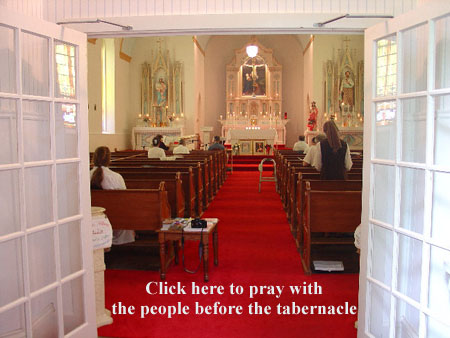 |
December 17, 2015
|
December 18th Holy Spirit Novena |
The Novena Rosary
Mysteries |
Prayer Service
December 17th - 6:20pm
Please tune in!
Pray for special intentions.
Pray for Dan & Melanie, Jimmy,
Fr. Joe, Mary, Blue Book 16.
Please pray for funds & grace.
Give the gift that Counts.
Blow Out Sale for Reprinting of Blue Book 1, 2 & 3



While Supplies Last
Blue Book 1 - $4 each plus postage
Blue Book 2 - $4 each plus postage
Blue Book 3 - $3 each plus postageCall 1-888-211-3041 for Doris
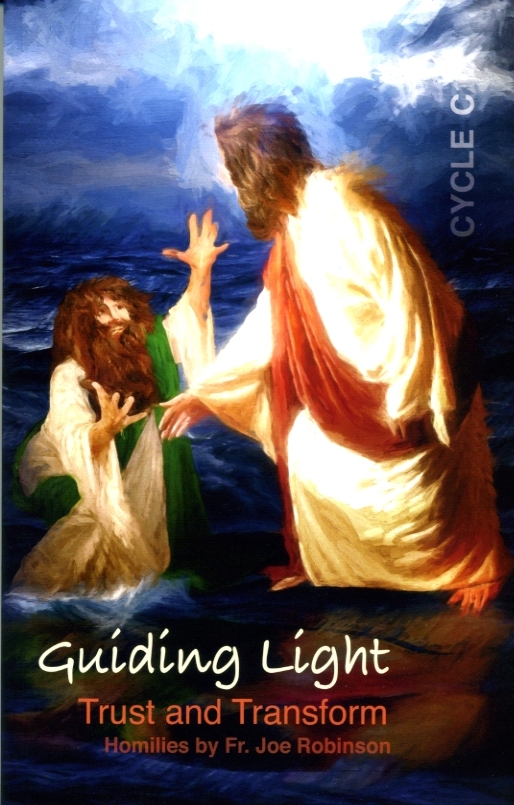
New Homily Book - Cycle C
Available $10.00 plus postage
December 17th is the anniversary of Mary's apparition in Clearwater 19 years ago.
Come to the 6:20 Prayer service December 17th.There will be a procession.
December 17, 2015
R. Dear God,
Thank You for putting Mary on
the building here in Clearwater
on Pope Francis' birthday.
Dear God, thank You for all You
have given to us in the Shepherds of Christ.
Dear God we love You so
very much, we want to serve
You in this Movement spreading
devotion to the Sacred Heart.
Sing:
Come to me, Lord, and possess my soul. Come into my heart
and permeate my soul.
Help me to sit in silence with You and let You work
in my heart.
I believe how important it is
to try to tell people to put Jesus
first as the King and Center of
their hearts.
If people put Jesus as the
King and Center of their hearts
they would do as God wants.
Eve was prideful. Eve wanted
to be equal to God.
We must see God as over us
and we live to do what He
wants of us. We want to be
under Him in everything.
we love Him and are grateful
for all His gifts to us.
R. God wants us to grow in
purity – grow in our image
and likeness to Him.
Sing:
Come to me, Lord, and possess my soul. Come into my heart
and permeate my soul.
Help me to sit in silence with You and let You work
in my heart.
Excerpt from Priestly Newsletter - July/August 1995
I am the good shepherd: the good shepherd is one who lays down his life for his sheep. The hired man, since he is not the shepherd and the sheep do not belong to him, abandons the sheep and runs away as soon as he sees a wolf coming, and then the wolf attacks and scatters the sheep; this is because he is only a hired man and has no concern for the sheep. I am the good shepherd; I know my own and my own know me, just as the Father knows me and I know the Father; and I lay down my life for my sheep. (Jn 10:11-151)
He hung upon a cross on a hill called Calvary. Death was near. How much Jesus had already suffered! He had been brutally scourged. Much of His sacred body was a bloody, open wound. He had been derisively crowned with thorns. In a terribly weakened condition, He carried the heavy cross to the hill of Golgotha. There He was stripped of His garments and mercilessly nailed to the cross. After all this brutal and agonizing suffering, Jesus finally died.
Truly, the Good Shepherd had laid down His life for His sheep. That magnificent Heart, overflowing with love for His Father and all of us, had beat its last in a complete and magnificent act of self-giving: “When they came to Jesus, they found He was already dead, and so instead of breaking His legs one of the soldiers pierced His side with a lance. And immediately there came out blood and water. (Jn 19: 33-34).
Indeed, from the pierced Heart of Christ the Church with her sacraments was born. Two of these sacraments, the Eucharist and Baptism, are symbolized by the blood and water flowing from Christ’s side. The sacrament of Orders was, of course, also born from the pierced Heart of Christ. We who are priests can never adequately thank Jesus for allowing us to receive this great and most special sacrament. The best way we can try to thank Him, though, is to utilize our priesthood to the fullest.
Each day we are called to imitate Jesus in His act of Self-giving. We, too, are called to lay down our lives for the flock. Relatively few priests in the course of the Church’s history have been called to lay down their lives in physical martyrdom. All priests, though, have been and are called to lay down their lives for the flock by giving themselves in loving service according to the Father’s will.
Our act of self-giving occurs within the framework of common everydayness. We grow in Christian holiness within the framework of everyday life or we don’t grow at all. This is such an obvious statement. It is one of those self-evident truths, a truth which no logical person would begin to challenge. Isn’t it strange, then, that we can rather often fail to live this truth? Inexplicably, we so often seem to think that our real opportunity for growth in holiness—for self-giving in love—is not the opportunity which is everyday, but that opportunity which is in a kind of no man’s land, an ethereal kind of opportunity removed from the ordinary pains and struggles and joys of everyday living, a nebulous opportunity which our hazy thinking really cannot pinpoint when we reflect upon the matter.
Our problem, then, is not that there is lacking ample opportunity for self-giving in love, for growth in holiness. Our problem rather is that we have a tendency to want different opportunities than everydayness presents.
Our task is to allow faith, hope, and love to be more vital, more operative, day-by-day, everyday. The more mature our Christian faith, hope, and love become, the more we will look upon each day as a renewed opportunity for self-giving in union with Jesus. We will increasingly come to see with a clearer vision that the opportunities for growth in priestly holiness, for growth in union with Jesus, Chief Shepherd of the Flock, are inserted deeply and firmly within the framework of everydayness. Yes, that’s where they exist, and in bountiful measure.
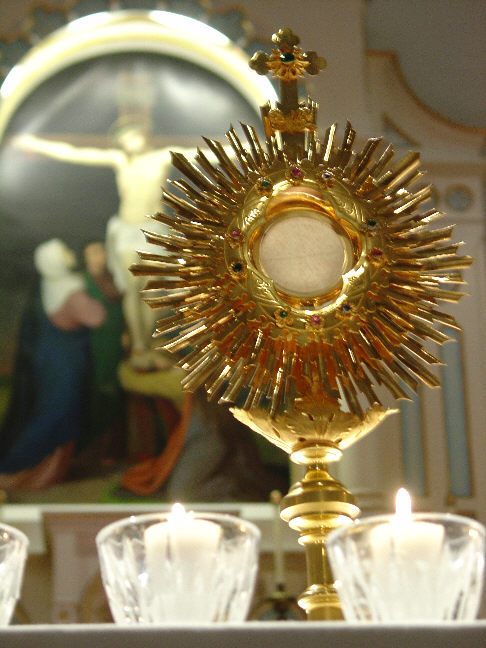
2The Self-giving of Jesus on Calvary is perpetuated in the Eucharist. The Eucharist is the chief source of our growth in self-giving. There follow various thoughts on the Eucharist which can deepen our appreciation of this magnificent gift of Jesus to us:
“Then he took some bread, and when he had given thanks, broke it and gave it to them, saying, ‘This is my body which will be given for you; do this as a memorial of me.’ He did the same with the cup after supper, and said, ‘This cup is the new covenant in my blood which will be poured out for you.’” (Lk 22: 19-20).
The Directory on the Ministry and Life of Priests offers us this vivid reminder concerning the connection between the Eucharist and the priest’s identity: “The sacramental memorial of the Death and Resurrection of Christ, the true and efficacious representative of the singular redemptive sacrifice, source and apex of Christian life in the whole of evangelization, the Eucharist is the beginning, means, and end of the priestly ministry, since all ecclesiastical ministries and works of the apostolate are bound up with the Eucharist and are directed towards it. Consecrated in order to perpetuate the Holy Sacrifice, the priest thus manifests, in the most evident manner, his identity.”
One of our readers, Fr. Maynard Kolodziej, O.F.M., in his booklet, Understanding the Mass, reminds us of the connection between the Eucharist and the Old Testament Passover. “As the Israelites belonged to the People of God through circumcision, so we belong to the People of God through baptism. As the Israelites shared in the benefits of the old covenant by participating in the Passover celebration, so we share in the benefits of the new covenant by participating in the new Passover celebration, the Eucharist.”
St. Peter Julian Eymard, founder of the Blessed Sacrament Fathers, gives us these bold words concerning Eucharistic devotion: “How is it that our Lord is so little loved in the Eucharist?
“One reason is that we do not speak enough of it and that we insist only on faith in the presence of Jesus Christ in the Most Blessed Sacrament instead of speaking about His life and His love therein…in a word, instead of showing Jesus Eucharistic with the personal and special love He has for each one of us.
“Another reason is our behavior, which denotes little love in us. From the way we pray, adore, and visit Him, no one would suspect the presence of Jesus Christ in our churches.
“How many among the best Catholics never pay a visit of devotion to the Most Blessed Sacrament to speak with Him from the Heart, to tell Him their love! They do not love our Lord in the Eucharist because they do not know Him well enough.
“But if, in spite of knowing Him and His love and the sacrifices and desires of His Heart, they still do not love Him, what an insult! Yes, an insult!
“For it amounts to telling Jesus Christ that He is not beautiful enough, not good enough, not lovable enough to be preferred to what they love.
“What ingratitude!
“After having received so many graces from this good Savior, made so many promises to love Him, and offered themselves so often to His service, such a treatment of Him is a mockery of His love.
“What cowardice!
“For if they do not want to know Him too well, to see Him at close quarters, to receive Him, to have a heart-to-heart talk with Him, the reason is they are afraid of being caught by His love. They fear being unable to resist His kindness; they fear being obliged to give in, to sacrifice their heart unreservedly, and their mind and life unconditionally.
“They are afraid of the love of Jesus Christ in the Most Blessed Sacrament, and they avoid Him.
“They are disturbed in His presence; they are afraid of yielding. Like Pilate and Herod they avoid His presence.”
4The Eucharist is not only a very special contact with God in Christ. In Christ we also relate to the other members of the Church. In receiving the Eucharist we pledge ourselves to deepen our love-union with all members of the Body which is the Church. We pledge to use these means which foster union. We determine to avoid that which causes selfish divisiveness.
The Eucharist also reminds us of our relationship with the entire human family. Jesus died and rose for all. The Eucharistic making-present of this paschal mystery nourishes our determination to assist in the work of ongoing redemption. The light of the Eucharist points to what we should be doing. The strength of the Eucharist assists us to so act in behalf of all.
The Eucharist, then, possesses the richest capacity to help us maintain and develop our personal relationship with God, the members of the Church, and all other members of the human family. And it will do just this if we surrender to its love, its power, its beauty.
Henri Nouwen observes: “Jesus is God-for-us. Jesus is God giving himself completely, pouring himself out for us without reserve. Jesus doesn’t hold back or cling to his own possessions…He gives all this to us…‘Eat, drink, this is My body, this is My blood…this is Me for you!’”
6The Eucharist is our chief source of growth in community. Each time we grow through the Eucharist we grow in the capacity to relate more deeply in love with the members of the Christian community as well as all others. Here are some reflections and comments on community:
“Now you together are Christ’s body; but each of you is a different part of it.” (1 Cor 12: 27).
I need you, you need me. Why at times do we pretend that it is otherwise?
John Downe, the British writer, far back in the seventeenth century, wrote these perennially applicable words: “No man is an island, entire of itself: every man is a piece of the continent, a part of the maine.”
To expect the community which is the Church to be without sins and blemishes is to demand too much. On the other hand, to want the Church humbly to labor at a vigorous, ongoing conversion is to desire what the Spirit Himself wishes.
Any form of Christian community must gaze inwardly upon itself in order to maintain and promote Spirit-inspired vitality. But if there is not a self-transcendence involved—a loving and concerned gaze outwardly toward the entire human family—then there is something tragically lacking.
Fr. Ladislaus Orsy, S.J., says: “There are, there were, and there will be weaknesses in the Church. What should be the response of a Christian? It cannot be anything else than the Christian response that is compassion. Bitter criticism and aggressive accusation do not heal wounds. If anything, they aggravate the condition of the sick. Besides, those attitudes hardly proceed from faith, hope and love.”
The little black boy and the little white boy hug each other in playful glee. How often little children can teach us—if we’re not too stubborn and supercilious to listen.
Needlessly to hurt another is simultaneously to hurt myself.
St. Clement, Pope, writes to the Corinthians: “Why are there strife and passion,
schisms and even war among you? Do we not possess the same spirit of grace which was given
to us and the same calling in Christ? Why do we tear apart and divide the body of Christ?
Why do we revolt against our own body? Why do we reach such a degree of insanity that we
forget that we are members one of another?…
“We should put an end to this division immediately. Let us fall down before our
master and implore his mercy with our tears. Then he will be reconciled to us and restore
us to the practice of brotherly love that befits us…A person may be faithful; he may
have the power to utter hidden mysteries; he may be discriminating in the evaluation of
what is said and pure in his actions. But the greater he seems to be, the more humbly he
ought to act, and the more zealous he should be for the common good rather than his own
interest.”
God has created each person as marvelously unique. He has also made us social beings. Each one’s uniqueness, therefore, is meant to unfold within the framework of community.
Fr. Avery Dulles, S.J., says, “The Church is a sign. It must signify in a historically tangible form the redeeming grace of Christ. It signifies that grace as relevantly given to…every age, race, kind, and condition. Hence the Church must incarnate itself in every human culture.”
Community is often built through pain-demanding and time-demanding effort. How quickly, though, one can harm community through the uncharitable, cutting, and divisive word.
To walk the path of life hand in hand with my brothers and sisters is Spirit-inspired wisdom. To want to walk alone is childish and pain-inflicting folly.
Some are guilty because they unjustly use the structures and institutions of society variously to harm their fellowmen. Others are guilty because they neglect their responsibility to aid in reforming and strengthening these same social structures.
Do I sincerely rejoice in the good others do? If not, why not? Community thrives on such rejoicing.
The Christian community is intended to be a terrestrial reflection of that ultimate and perfect community—the Trinitarian life of Father, Son, and Holy Spirit.
“If our life in Christ means anything to you, if love can persuade at all, or the Spirit that we have in common, or any tenderness and sympathy, then be united in your convictions and united in your love, with a common purpose and a common mind. That is the one thing which would make me completely happy. There must be no competition among you, no conceit; but everybody is to be self-effacing. Always consider the other person to be better than yourself, so that nobody thinks of his own interests first but everybody thinks of other people’s interests instead.” (Phil 2: 1-4).
10From his recently published and best selling book, Crossing the Threshold of Hope, John Paul II gives us these insightful words which continue our theme on self-giving in union with Jesus:
“Therefore, these two aspects—the affirmation of the person as a person and the sincere gift of self do not exclude each other—they mutually confirm and complete each other. Man affirms himself most completely by giving of himself. This is the fulfillment of the commandment of love. This is also the full truth about man, a truth that Christ taught us by His life, and that the tradition of Christian morality, no less than the tradition of saints and of the many heroes of love of neighbor, took up and lived out in the course of history.
“If we deprive human freedom of this possibility, if man does not commit himself to becoming a gift for others, then this freedom can become dangerous. It will become freedom to do what I myself consider as good, what brings me a profit or pleasure, even a sublimated pleasure. If we cannot accept the prospect of giving ourselves as a gift, then the danger of a selfish freedom will always be present. Kant fought against this danger, and along the same line so did Max Scheler and so many after him who shared his ethics of values. But a complete expression of all this is already found in the Gospel. For this very reason, we can find in the Gospel a consistent declaration of all human rights, even those that for various reasons can make us feel uneasy.”
11The Saints are ones who have achieved a self-giving in love to an outstanding degree. Their teaching is given to us as an aid in our own quest for the highest self-giving in union with Christ.
St. Ignatius of Antioch: “At last I am well on the way to being a disciple. May nothing, seen or unseen, fascinate me, so that I may happily make my way to Jesus Christ! Fire, cross, struggles with wild beasts, wrenching of bones, mangling of limbs, crunching of the whole body, cruel tortures inflicted by the devil—let them come upon me, provided only I make my way to Jesus Christ.”
St. John of the Cross: “What does it profit you to give God one thing if He asks for another? Consider what it is God wants and then do it.”
12St. Teresa of Avila. In the following words from her classic work, The Interior Castle, Teresa is speaking of those who seek to bypass the humanity of Jesus in their prayer: “How much more is it necessary not to withdraw through one’s own efforts from all our good and help which is the most sacred humanity of our Lord Jesus Christ. I cannot believe that these souls do so, but they just don’t understand; and they will do harm to themselves and to others.”
13St. Bernard: “I said in the beginning: the reason for our loving God is God. I spoke the truth, for He is both prime mover of our love and final end. He is Himself our human love’s occasion; He also gives the power to love, and brings desire to its consummation. He is Himself the Lovable…and gives Himself to be the object of our love…How kindly does He lead us in love’s way, how generously He returns the love we give, how sweet He is to those who wait for Him!”
14St. Francis of Assisi: “Our Lord says in the Gospel, Love your enemies. A man really loves his enemy when he is not offended by the injury done to himself, but for love of God feels burning sorrow for the sin his enemy has brought on his own soul.”
15“We can never tell how patient or humble a person is when everything is going well with him. But when those who should cooperate with him do the exact opposite, then we can tell. A man has as much patience and humility as he has then, and no more.”
16“Blessed are the peacemakers, for they shall be called the children of God. They are truly peacemakers who are able to preserve their peace of mind and heart for love of our Lord Jesus Christ, despite all that they suffer in this world.”
17St. Ignatius of Loyola. “It is characteristic of God and His Angels, when they act upon the soul, to give true happiness and spiritual joy, and to banish all the sadness and disturbances which are caused by the enemy.
“It is characteristic of the evil one to fight against such happiness and consolation by proposing fallacious reasonings, subtleties, and continual deceptions.
“In souls that are progressing to greater perfection, the action of the good angel is delicate, gentle, delightful. It may be compared to a drop of water penetrating a sponge.
“The action of the evil spirit upon such souls is violent, noisy and disturbing. It may be compared to a drop of water falling upon a stone.
“In souls that are going from bad to worse, the action of the spirits mentioned above is just the reverse. The reason for this is to be sought in the opposition or similarity of these souls to the different kinds of spirits. When the disposition is contrary to that of the spirits, they enter with noise and commotion that are easily perceived. When the disposition is similar to that of the spirits, they enter silently, as one coming into his own house when the doors are open.”
18St. Benedict. The following words are from the Rule of St. Benedict. Although they directly pertain to life in the monastery, they are profitable for all, for they breathe the spirit of peace so central to Benedictine spirituality: “…and so we are going to establish a school for the service of the Lord. In founding it we hope to introduce nothing harsh or burdensome. But if a certain strictness results from the dictates of equity for the amendment of vices or the preservation of charity, do not be at once dismayed and fly from the way of salvation, whose entrance cannot but be narrow, for as we advance in the religious life and in faith, our hearts expand and we run the way of God’s commandments with unspeakable sweetness of love. Thus, never departing from His school, but persevering in the monastery according to His teaching until death, we may by patience share in the sufferings of Christ and deserve to have a share also in His kingdom.”
19St. Dominic. From Various Writings on the History of the Order of Preachers we have these words concerning St. Dominic: “Dominic possessed such great integrity and was so strongly motivated by divine love, that without a doubt he proved to be a bearer of honor and grace. He was a man of great equanimity, except when moved to compassion and mercy. And since a joyful heart animates the face, he displayed the peaceful composure of a spiritual man in the kindness he manifested outwardly and by the cheerfulness of his countenance.”
20St. Jean Vianney. “What keeps us priests back from the attainment of holiness is lack of consideration. It displeases us to withdraw our minds from outside things. We do not know what we rightly do. We have need of intimate reflection, continuous prayer and intimate union with God.”
21Scriptural quotations are taken from The Jerusalem Bible, Doubleday & Co.
Directory on the Ministry and Life of Priests, as in special supplement, Inside the Vatican, p. 181.
Maynard Kolodziej, O.F.M., Understanding the Mass, Franciscan Publishers, p. 31.
The Treasury of Catholic Wisdom, ed., John Hardon, S.J., Ignatius Press, p. 582.
Henri Nouwen, With Burning Hearts, Orbis Books, p. 67.
John Donne, “Devotions Upon Emergent Occasions,” XVII, as in John Donne, Complete Poetry and Selected Prose, ed., John Hayward, The Nonesuch Press, p. 538.
Ladislaus Orsy, S.J., “On Being One with the Church Today,” Studies in the Spirituality of Jesuits, Vol. VII, January.
St. Clement, Pope, from a letter to the Corinthians, as in The Liturgy of the Hours, Catholic Book Publishing Co., Vol. III, pp. 455-456.
Avery Dulles, Models of the Church, Doubleday, p. 63.
Pope John Paul II, Crossing the Threshold of Hope, Alfred A. Knopf, p. 202.
St. Ignatius of Antioch, “Ignatius to the Romans,” as in The Treasury of Catholic Wisdom, op.cit., p. 14.
St. John of the Cross, “Sayings of Light and Love,” No. 70, as in The Treasury of Catholic Wisdom, op. cit., p. 495.
St. Teresa of Avila, “The Interior Castle,” Bk. VI, Ch. 7, as in The Collectible Works of St. Teresa of Avila, tr., Kieran Kavanaugh, O.C.D., and Otilio Rodriguez, O.C.D., ICS Publications, Vol. II, p. 399.
St. Bernard, “On the Love of God,” as in The Treasury of Catholic Wisdom, op. cit., p. 193.
St. Francis of Assisi, “The Admonitions,” No. IX, as in The Treasury of Catholic Wisdom, op. cit., p.217.
Ibid., No. XIII, p. 218.
Ibid., No. XV, p. 219.
The Spiritual Exercises of St. Ignatius, Newman Press, Nos. 329, 335.
The Rules of St. Benedict,” Prologue, as in The Treasury of Catholic Wisdom, p. 165.
From the "Various Writings of the History of the Order of Preachers,” as in The Liturgy of the Hours, Catholic Book Publishing Co., Vol. IV, p. 1302.
Pope John XXIII, The Curé of Ars and the Priesthood, Encyclical Letter, Paulist Press, p. 16.
Give the gift that keeps giving.
6 different Blue Books for $30.00 including postage
$6.00
$5.00
$4.00
$2.00
$2.00
$3.00
$3.00
$3.00
$3.00
$3.00
$3.00
$3.00
$3.00
$3.00
$3.00

$5.00 $5.00Books available in limited supply for this sale.
The more you use the Blue Books and
become one with Jesus – more
intimate with Jesus –
the more your lives are a blessing and
everything you do in life can help
to bring down great grace for the world
because of your being so
one with Jesus.
Guiding Light Homily Book Series
Fr. Joe’s Books
Cycle A –
Steadfast to the Son
Cycle B –
Focusing on the Word
Cycle C –
Feed My Soul
Cycle A –
Inspired to be Genuine4 for $20 plus postage of $5.95
These books can be given to:
1) All Priests
2) Good for Music Ministers
3) Good for DRE's
4) Good for Deacons
5) Good for Principals of Schools
6) Good for Teachers
7) Good for Mom and Dads
Given March 21, 2014
R. Pray for These Things
1) Pray for the Pope & hierarchy to help us start prayer chapters.
2) Pray for Dan, Sally Jo, Richard, Carol, Margaret, Sue,
Jack, Jean, Amanda, Matthew, Special intentions.
3) Pray for the priests, the Church and the world!
4) Pray for the spread of prayer chapters,
also for the spread of priests doing prayer chapters.
5) Pray for the spread of Blue Books.
6) People going to Florida and China.
7) Vocations to all 7 categories.
8) Pray for spread of Consecration and Rosary.
9) Pray for pope helping us.
10) Pray for Jeff - sales & health. Pray for Nick.
11) Blue Book 16 and cover and all involved.
For our Publisher and all involved
12) All intentions on my list, Jerry's list.
13) Priests getting Fr. Joe's book.
14) Pray for Fr. Joe's new book, cover & funds for printing & postage.
15) Donors and members and their families.
16) Healing of the Family tree.
17) Dan & Melanie, Catherine & mom, Gary, Mary Jo,
Jim & statues, Fr. Ken, Monsignor, Kerry, Tom & wife.
18) All who asked us to pray for them.
19) All we promised to pray for.
20) Rita, John, Doris, Sheila, Jerry, Regina, Sanja,
Betty, Sophie, Lisa, Eileen, Fr. Mike, Louie, Laverne,
2 Dons, Mary Ellen, Fr. Joe, all priests helping us,
Ed, Jimmy, Steve, a special couple, Rosie & all involved.
21) 2 babies and moms.
22) Funds and insurance.
23) Jerry's garage.
24) In thanksgiving for gifts, graces, & blessings received.
25) Spread the Blood of Jesus on all of us here.
26) Consecrate all hearts.
27) Cast the devil out of all of us here and all in Movement.
The Wedding Rosary
Crystal Image Rosary
$40 plus shipping
Original Image Rosary
8mm glass beads
in a matching gift box$40 plus shipping
Give the gift that counts.
Give to your priests Fr. Carter's Books plus postage.
Tell My People $5.00
Response to God's Love $8.00
Response in Christ $8.00
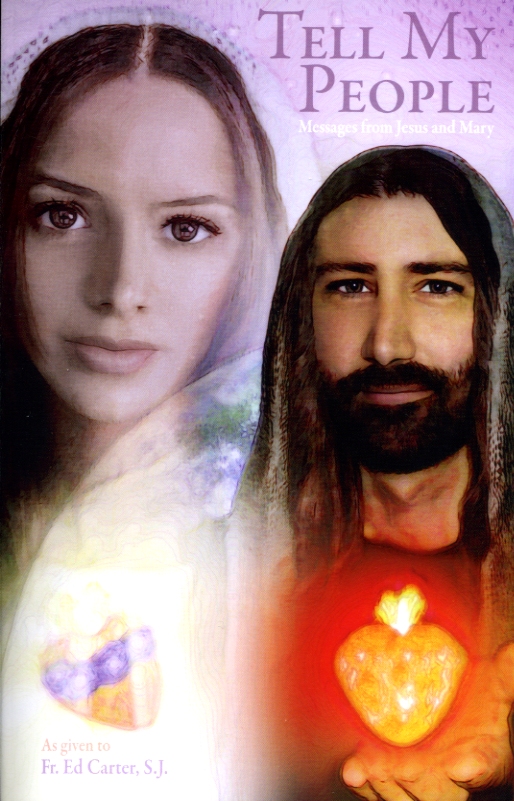
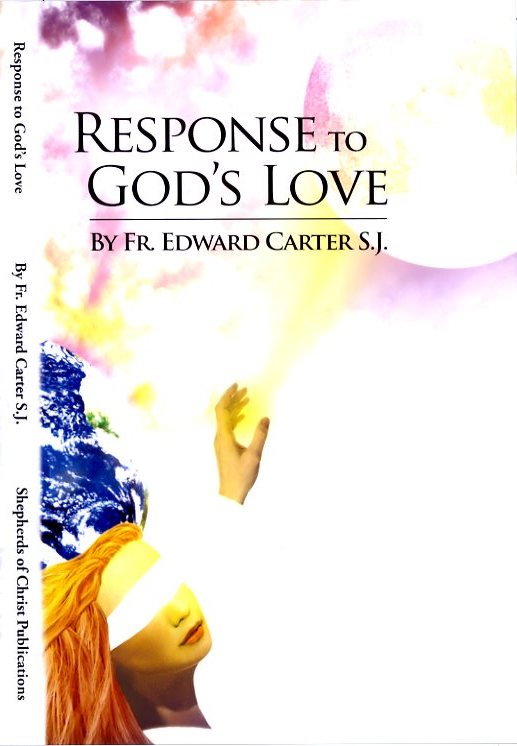
Old Mass Books with the Imprimatur
$2.00 plus postage
New Mass Book with Imprimatur
$8.00 plus postage
New Parents & Children's Book with the Imprimatur
$8.00 plus postage
Fr. Joe's Cycle A – Steadfast to the Sun – Starts in Advent
$5.00 plus postage
Give the gift that keeps on giving!
Give to your priest.
Fr. Carter's Priestly Newsletters Book II
$6.00 plus postage
Get a canvas print of Mary's image
with a sliver of glass and a little
bottle of Jesus and Mary water.
The glass will be fixed behind the
back of the picture.
$200.00 plus postage
Shepherds of Christ Ministries
P.O. Box 627 China, Indiana 47250
Telephone: (toll free) 1-888-211-3041 or (812) 273-8405
FAX: (812) 273-3182
Copyright © 2014 Shepherds of Christ.
Rights for non–commercial reproduction granted:
May be copied in its entirety, but neither re–typed nor edited.
Translations are welcome but they must be reviewed for moral and
theological accuracy by a source approved by Shepherds of Christ Ministries
before any distribution takes place. Please contact us for more information.